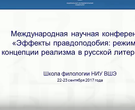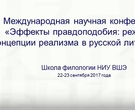- A
- A
- A
- АБB
- АБB
- АБB
- А
- А
- А
- А
- А
- Национальный исследовательский университет «Высшая школа экономики»
- Факультет гуманитарных наук
- Школа филологических наук
- 15 и 16 октября 2013 на факультете филологии НИУ ВШЭ состоялись лекции Марии Полинской (университет Гарварда).
-
Школа
- О школе
- Сотрудники
- Образовательная деятельность
- Научные семинары школы
- Аспирантская школа по филологическим наукам
- Майнор "Инструменты эффективной коммуникации"
-
Проекты школы
-
- Летопись жизни и творчества Б.Л. Пастернака
- Большой проект «Русская литература в социальном измерении: компьютерная платформа СОЦИОЛИТ»
- Всеволод Некрасов. Литературный архив
- Большой проект «Речевые практики»
- Трансформация коммуникативной модели в эго-текстах русского модернизма
- Сравнительное изучение метрического стихосложения на фоне языковой просодии: цифровая аналитическая платформа “Прозиметрон”
-
- Майнор "История литературы"
-
Подразделения
- Лаборатории
- Научно-учебные группы
- Мандельштамовский центр
Адрес: 105066, г. Москва,
Старая Басманная ул., д. 21/4
Т. 1: Разделы I–XI. М.: Русский фонд содействия образованию и науке (Университет Дмитрия Пожарского), 2025.
Новое литературное обозрение. 2025. № 4. С. 76-92.
В кн.: Индоевропейское языкознание и классическая филология - XXIX (1). СПб.: Институт лингвистических исследований РАН, 2025. С. 425-430.
Адрес: 105066, г. Москва,
Старая Басманная ул., д. 21/4
15 и 16 октября 2013 на факультете филологии НИУ ВШЭ состоялись лекции Марии Полинской (университет Гарварда).
Lecture 1. Introduction to theoretical + experimental syntax: main principles and methodologies
In this lecture, we will discuss some main principles of modern theoretical syntax, with a special emphasis on assumptions, stipulations, and argumentation. We will examine such phenomena as displacement (movement), adjunction, and silent (null) categories in grammar. Once these building blocks have been established, we will address ways of exploring their psychological reality. The second part of the lecture will therefore include three main components: (a) an illustration of how experimental investigations can change theoretical outlook; (b) an overview of behavioral and instrumental methodologies in experimental approaches to syntax; (c) discussion of several relevant topics in experimental syntax (movement; headedness; compositionality; silent categories; case categories).
Polinsky 1 Cognitive Syntax.pdf
Lecture 2. The psychological reality of silent categories
This lecture will address the following questions: (i) is there experimental evidence in favor of the empty categories posited in theoretical syntax in general?, and (ii) is there evidence supporting fine-grained distinctions among empty categories, such as the difference between pronominals and traces? We will discuss neuro-imaging work on Korean and Japanese and recent behavioral studies on Russian. We will then compare the syntactic and semantic accounts which have been offered in response to the data elicited in these studies.
Polinsky 2 Silence.pdf
Lecture 3. The value of special populations: child language and heritage language
Sometimes in order to understand how things work it helps to take them apart, so that the components become more visible. In this lecture, we will discuss some differences between adult and child representations of scope and then examine similar phenomena in natively acquired versus heritage language (where ‘heritage language’ signifies the home language of second generation immigrants). Such comparisons are needed to determine when and how scope interpretations are set in grammar. If time permits, we will also explore the representation of the (theoretical) difference between structural and inherent case in heritage language, and the representation of gender categories in child and heritage language.
Polinsky 3 Heritage.pdf
- О ВЫШКЕ
- Цифры и факты
- Руководство и структура
- Устойчивое развитие в НИУ ВШЭ
- Преподаватели и сотрудники
- Корпуса и общежития
- Закупки
- Обращения граждан в НИУ ВШЭ
- Фонд целевого капитала
- Противодействие коррупции
- Сведения о доходах, расходах, об имуществе и обязательствах имущественного характера
- Сведения об образовательной организации
- Людям с ограниченными возможностями здоровья
- Единая платежная страница
- Работа в Вышке
- ОБРАЗОВАНИЕ
- Лицей
- Довузовская подготовка
- Олимпиады
- Прием в бакалавриат
- Вышка+
- Прием в магистратуру
- Аспирантура
- Дополнительное образование
- Центр развития карьеры
- Бизнес-инкубатор ВШЭ
- Образовательные партнерства
- Обратная связь и взаимодействие с получателями услуг
-
http://www.minobrnauki.gov.ru/
Министерство науки и высшего образования РФ
-
https://edu.gov.ru/
Министерство просвещения РФ
-
http://www.edu.ru
Федеральный портал «Российское образование»
-
https://elearning.hse.ru/mooc
Массовые открытые онлайн-курсы
- © НИУ ВШЭ 1993–2025 Адреса и контакты Условия использования материалов Политика конфиденциальности Карта сайта
- Редактору





